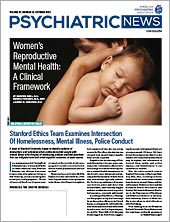A psychiatrist, who is also a U.S. military veteran, was seriously assaulted on her inpatient psychiatric ward by one of her patients whom she had been seeing in her office located on the ward. Staff members rescued her after being alerted by the loud commotion emanating from the psychiatrist’s office. The psychiatrist was shocked and shaken by the assault, but soon thereafter, she vigorously advocated for the patient not to be transferred to another ward as the assault was psychotically motivated. However, after some reflection, the facility medical director separated the patient from the psychiatrist by moving the patient to another ward.
The risk of psychiatrists being physically assaulted by their patients is not minimal, with studies stating that psychiatrists have a 5% to 48% chance of being assaulted by their patients during their careers, according to a study in Psychiatric Services. The United States Department of Justice’s National Crime Victimization Survey (1993-1999) found the annual rate of job-related violent crime among psychiatrists and mental health professionals to be 68.2 per 1,000, compared with 12.6 per 1,000 workers in all occupations and 16.2 among all physicians. Even psychiatry residents were not spared as reports suggest that 40% to 50% of them will suffer physical assault by a patient during their psychiatry training, also according to the Psychiatric Services study.
These rates of assaults are so common that psychiatrists have accepted them as the cost of working in this field. The ethics injunction that states that the physician-patient relationship is solely for the benefit of the patient is interpreted literally. Even in the face of a physician assault by psychiatrically ill patients, the physician believes the focus should be on treating agitated patients and making them comfortable rather than on the assaulted physician. However, these kinds of situations are not always that simple or straightforward. A patient assault on the ward psychiatrist affects the milieu, other staff members, and other patients. I am aware of a situation in which another patient on the ward went after the assaultive patient in retaliation to defend the honor of the beloved injured psychiatrist. Further, it would be naïve to believe that the assault did not affect the psychiatrist’s view of the patient and that decisions regarding the patient’s care are not consciously or unconsciously influenced by the assault. In my experience, a physically assaulted psychiatrist is less likely to acknowledge the trauma experienced from the assault and more likely to put up a brave face for other staff members and patients, believing that to be what a leader does. It would, however, be important to acknowledge the psychiatrist’s trauma response in the provision of care to the assaultive patient. In the psychiatrist’s case described earlier, the assault triggered underlying posttraumatic stress disorder from the psychiatrist’s days in the military. Therefore, the decision to keep the patient on the ward to be treated by the “victim” psychiatrist should be considered with much reflection.
The assaulted psychiatrist should explore the issues through an ethics lens—whether the patient can be treated fairly, to what degree would the patient’s autonomy be further impacted, and would the patient’s continued stay on the unit be helpful or harmful to the patient. Some of the specific questions that should be contemplated include the following:
•
Would the patient receive the same care and attention from the psychiatrist and other staff members as other patients who are similarly situated on the ward?
•
Would decisions about type and dose of medication be influenced consciously or unconsciously by the assault?
•
Would the patient’s privilege levels be negatively impacted for longer than necessary?
•
Would the patient’s freedom of movement be unnecessarily curtailed beyond what is customary for other aggressive patients? For example, would the patient be placed on special observation status complete with the associated stringent restrictions for an extended period? What about decisions regarding accessing hospital grounds or community trips?
•
Would discussions about discharge placement be negatively influenced?
Most psychiatrists following an assault would reflexively respond to these questions in a favorable light and may not be aware of their unconscious biases.
A similar example is a psychiatrist whose patient died by suicide on the ward through no fault of the psychiatrist’s care. However, over time, the psychiatrist became gradually more conservative such that patients who were deemed to have a slightly higher than average risk of self-harm or suicide were held on close observation status for extended periods and discharged to the community with much reluctance. The patients’ unfair and sometimes harmful treatment was the direct consequence of the psychiatrist’s trauma.
A patient’s assault on a psychiatrist is not a trivial matter. Psychiatrists may not fully appreciate the impact of the assault when it occurs and may need a few days to process their feelings and reactions. While affirming our core ethics principle that the physician-patient relationship must be for the benefit of the patient, the emotional state of the psychiatrist should not be ignored. Hence, taking care of the psychiatrist’s needs after a traumatic event ultimately benefits the patient. The psychiatrist may feel guilty or even ashamed for having negative reactions against the patient. The onus may fall on the facility medical director to relieve the guilt of the psychiatrist and encourage the healing process by overriding the psychiatrist’s well-meaning but ill-conceived decision to continue treating the patient. Even a temporary separation from the patient may be necessary. It may be the most ethical response in some circumstances. ■

